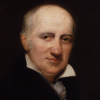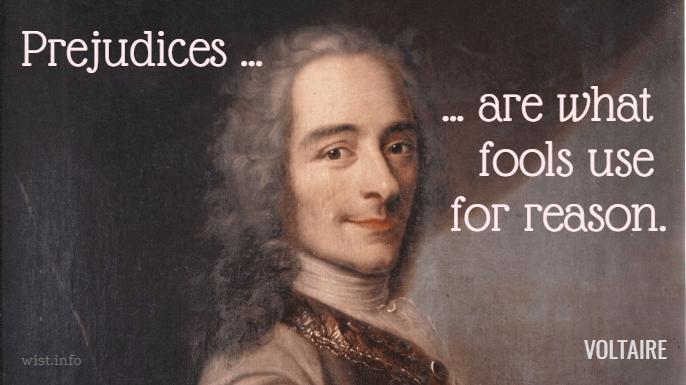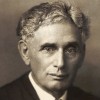Every man has a certain sphere of discretion, which he has a right to expect shall not be infringed by his neighbors. This right flows from the very nature of man. First, all men are fallible: no man can be justified in setting up his judgment as a standard for others. We have no infallible judge of controversies; each man in his own apprehension is right in his decisions; and we can find no satisfactory mode of adjusting their jarring pretensions. If every one be desirous of imposing his sense upon others, it will at last come to be a controversy, not of reason, but of force.
William Godwin (1756-1836) English journalist, political philosopher, novelist
Enquiry Concerning Political Justice, Book 2, ch. 5 (1793)
(Source)
Quotations about:
reason
Note not all quotations have been tagged, so Search may find additional quotes on this topic.
What is madness? To have erroneous perceptions and to reason correctly from them.
Voltaire (1694-1778) French writer [pseud. of Francois-Marie Arouet]
Philosophical Dictionary, “Madness” (1764)
(Source)
There may be no good reason for things to be the way they are.
Alain de Botton (b. 1969) Swiss-British author
The Consolations of Philosophy, ch. 1 “Consolations for Unpopularity,” sec. 4 (2000)
(Source)
Stupidity is a more dangerous enemy of the good than malice. One may protest against evil; it can be exposed and, if need be, prevented by use of force. Evil always carries within itself the germ of its own subversion in that it leaves behind in human beings at least a sense of unease. Against stupidity we are defenseless. Neither protests nor the use of force accomplish anything here; reasons fall on deaf ears; facts that contradict one’s prejudgment simply need not be believed — in such moments the stupid person even becomes critical — and when facts are irrefutable they are just pushed aside as inconsequential, as incidental. In all this the stupid person, in contrast to the malicious one, is utterly self-satisfied and, being easily irritated, becomes dangerous by going on the attack. For that reason, greater caution is called for when dealing with a stupid person than with a malicious one. Never again will we try to persuade the stupid person with reasons, for it is senseless and dangerous.
Dietrich Bonhoeffer (1906-1945) German Lutheran pastor, theologian, martyr
“On Stupidity” (1942)
(Source)
Reason! reason! … As much as you like; but beware of thinking that it answers to everything, suffices for everything, satisfies everything. This mother loses her child: will reason comfort her? Does cool reason counsel the inspired poet, the heroic warrior, the lover? Reason guides but a small part of man, and that the least interesting. The rest obeys feeling, true or false, and passion, good or bad.
Joseph Roux (1834-1886) French Catholic priest
Meditations of a Parish Priest: Thoughts, ch. 4, #95 (1886)
(Source)
God created Reason, and it was the most beautiful being in his creation: and God said to it, “I have not created anything better or more perfect or more beautiful than thou: blessings will come down on mankind on thy account, and they will be judged according to the use they make of thee.”
Muhammad (570-632) Arabian merchant, prophet, founder of Islam [Mohammed]
Hadith
(Source)
In Syed Ameer Ali, A Critical Examination of the Life and Teachings of Mohammed (1873), cited to The Kitâb-ul-Mustarif, ch. 2, and The Mishkât, Bk 22, ch. 18, pt. 3 (from Abu Hurairah)
Heaven will solve our problems, but not, I think, by showing us subtle reconciliations between all our apparently contradictory notions. The notions will all be knocked from under our feet. We shall see that there never was any problem.
Sometimes I wonder whether if I’d been the one that went for coffee and not Leslie May my life would have been much less interesting and certainly much less dangerous. Could it have been anyone, or was it destiny? When I’m considering this I find it helpful to quote the wisdom of my father, who once told me, “Who knows why the fuck anything happens?”
The voice of passion is better than the voice of reason.
The passionless cannot change history.Czesław Miłosz (1911-2004) Polish-Lithuanian poet, essayist, diplomat
“The Child of Europe” (1946)
(Source)
Reasoning will never make a Man correct an ill Opinion, which by Reasoning he never acquired.
Jonathan Swift (1667-1745) English writer and churchman
“Letter to a Young Clergyman” (9 Jan 1720)
(Source)
Earliest version of this general sentiment, which has been attributed to (or at times borrowed by) figures such as Sydney Smith, Fisher Ames, and Lyman Beecher.
For more information about this quotation: You Cannot Reason People Out of Something They Were Not Reasoned Into – Quote Investigator.
Some people are to be reasoned, some flattered, some intimidated, and some teased into a thing; but, in general, all are to be brought into it at last, if skillfully applied to, properly managed, and indefatigably attacked in their several weak places.
Lord Chesterfield (1694-1773) English statesman, wit [Philip Dormer Stanhope]
Letter to his son, #183 (22 May 1749)
(Source)
Would you persuade, speak of Interest, not of Reason.
Benjamin Franklin (1706-1790) American statesman, scientist, philosopher, aphorist
Poor Richard (1734 ed.)
(Source)
The man who has no tincture of philosophy goes through life imprisoned in the prejudices derived from common sense, from the habitual beliefs of his age or his nation, and from convictions which have grown up in his mind without the co-operation or consent of his deliberate reason.
The conservative has but little to fear from the man whose reason is the servant of his passions, but let him beware of him in whom reason has become the greatest and most terrible of the passions. These are the wreckers of outworn empires and civilisations, doubters, disintegrators, deiciders.
J.B.S. Haldane (1892-1964) English geneticist [John Burden Sanderson Haldane]
“Daedalus, or Science and the Future,” speech, Cambridge (24 Feb 1923)
(Source)
Faith is not fearful of reason; on the contrary, it seeks and trusts reason, since “the light of reason and the light of faith both come from God” and cannot contradict each other.
Francis I (b. 1936) Argentinian Catholic Pope (2013- ) [b. Jorge Mario Bergoglio]
Evangelii Gaudium, sec. 203 (24 Nov 2013)
(Source)
Quoted section is Thomas Aquinas, Summa contra Gentiles, I, 7.
Prejudice, not being founded on reason, cannot be removed by argument.
Samuel Johnson (1709-1784) English writer, lexicographer, critic
(Spurious)
(Source)
Frequently attributed without citation, and not found in Johnson's works. However, the phrase can be found in other contexts:
- "This objection on the score of color is founded upon prejudice, and hence cannot be removed by argument, for prejudice is blind and listens not to reason." -- Rep. Godlove S. Orth of Indiana, speech before the House of Representatives (5 Apr 1869) on the question of admitting the Dominican Republic as a US territory.
- "This persuasion of the power of the priest is, as we have said, a traditional prejudice; it is not founded on any reasons or proofs addressed to the understanding, and therefore it cannot be removed by argument." -- John Eliot Howard, The Island of the Saints (1855), quoting from the Achill Herald (Jun 1855).
It is very natural for young men to be vehement, acrimonious and severe. For as they seldom comprehend at once all the consequences of a position, or perceive the difficulties by which cooler and more experienced reasoners are restrained from confidence, they form their conclusions with great precipitance. Seeing nothing that can darken or embarrass the question, they expect to find their own opinion universally prevalent, and are inclined to impute uncertainty and hesitation to want of honesty, rather than of knowledge.
Samuel Johnson (1709-1784) English writer, lexicographer, critic
The Rambler, #121 (14 May 1751)
(Source)
Read the bible then, as you would read Livy or Tacitus. The facts which are within the ordinary course of nature you will believe on the authority of the writer, as you do those of the same kind in Livy and Tacitus. The testimony of the writer weighs in their favor in one scale, and their not being against the laws of nature does not weigh against them. But those facts in the bible which contradict the laws of nature, must be examined with more care, and under a variety of faces. Here you must recur to the pretensions of the writer to inspiration from god. Examine upon what evidence his pretensions are founded, and whether that evidence is so strong as that it’s falshood would be more improbable than a change of the laws of nature in the case he relates For example in the book of Joshua we are told the sun stood still several hours. Were we to read that fact in Livy or Tacitus we should class it with their showers of blood, speaking of statues, beasts &c., but it is said that the writer of that book was inspired. Examine therefore candidly what evidence there is of his having been inspired. The pretension is entitled to your enquiry, because millions believe it. On the other hand you are Astronomer enough to know how contrary it is to the law of nature that a body revolving on it’s axis, as the earth does, should have stopped, should not by that sudden stoppage have prostrated animals, trees, buildings, and should after a certain time have resumed it’s revolution, and that without a second general prostration. Is this arrest of the earth’s motion, or the evidence which affirms it, most within the law of probabilities?
Thomas Jefferson (1743-1826) American political philosopher, polymath, statesman, US President (1801-09)
Letter to Peter Carr (10 Aug 1787)
(Source)
He who made us would have been a pitiful bungler if he had made the rules of our moral conduct a matter of science. For one man of science, there are thousands who are not. What would have become of them? Man was destined for society. His morality therefore was to be formed to this object. He was endowed with a sense of right and wrong merely relative to this. This sense is as much a part of his nature as the sense of hearing, seeing, feeling; it is the true foundation of morality, and not the truth, &c., as fanciful writers have imagined. The moral sense, or conscience, is as much a part of man as his leg or arm. It is given to all human beings in a stronger or weaker degree, as force of members is given them in a greater or less degree. It may be strengthened by exercise, as may any particular limb of the body. This sense is submitted indeed in some degree to the guidance of reason; but it is a small stock which is required for this: even a less one than what we call Common sense.
Thomas Jefferson (1743-1826) American political philosopher, polymath, statesman, US President (1801-09)
Letter to Peter Carr (10 Aug 1787)
(Source)
All you learn and all you can read will be of little use to you if you do not think and reason upon it yourself. One reads to know other people’s thoughts, but if we take them upon trust, without examining and comparing them with our own, it is really living upon other people’s scraps or retailing other people’s goods. To know the thoughts of others, is of use, because it suggests thoughts to one’s self, and helps one
to form a judgment; but to repeat other people’s thoughts, without considering whether they are right or wrong, is the talent only of a parrot, or at most a player.Lord Chesterfield (1694-1773) English statesman, wit [Philip Dormer Stanhope]
Letter to his son, #67, “Thursday” (1740-41)
(Source)
Well aware that the opinions and belief of men depend not on their own will, but follow involuntarily the evidence proposed to their minds; that Almighty God hath created the mind free, and manifested his supreme will that free it shall remain by making it altogether insusceptible of restraint; that all attempts to influence it by temporal punishments, or burthens, or by civil incapacitations, tend only to beget habits of hypocrisy and meanness, and are a departure from the plan of the holy author of our religion, who being lord both of body and mind, yet chose not to propagate it by coercions on either, as was in his Almighty power to do, but to extend it by its influence on reason alone; that the impious presumption of legislators and rulers, civil as well as ecclesiastical, who, being themselves but fallible and uninspired men, have assumed dominion over the faith of others, setting up their own opinions and modes of thinking as the only true and infallible, and as such endeavoring to impose them on others, hath established and maintained false religions over the greatest part of the world and through all time ….
Thomas Jefferson (1743-1826) American political philosopher, polymath, statesman, US President (1801-09)
“Virginia Statute for Religious Freedom,” Preamble (18 Jun 1779; enacted 16 Jan 1786)
(Source)
During final debate around the bill's passage:See Jefferson's discussion about a failed amendment to the preamble here.
- the first clause was struck, changing the beginning to "Whereas Almighty God ...."
- the phrase "and manifested his supreme will that free it shall remain by making it altogether insusceptible of restraint" was struck.
- the phrase "but to extend it by its influence on reason alone" was struck.
The judgments which Johnson passed on books were, in his own time, regarded with superstitious veneration, and, in our time, are generally treated with indiscriminate contempt. They are the judgments of a strong but enslaved understanding. The mind of the critic was hedged round by an uninterrupted fence of prejudices and superstitions. Within his narrow limits, he displayed a vigour and an activity which ought to have enabled him to clear the barrier that confined him. How it chanced that a man who reasoned on his premises so ably, should assume his premises so foolishly, is one of the great mysteries of human nature.
Thomas Babington Macaulay (1800-1859) English writer and politician
“Samuel Johnson,” The Edinburgh Review (Sep 1831)
(Source)
Review of John Croker's 1831 edition of James Boswell, The Life of Samuel Johnson.
And the day will come when the mystical generation of Jesus, by the supreme being as his father in the womb of a virgin will be classed with the fable of the generation of Minerva in the brain of Jupiter. But may we hope that the dawn of reason and freedom of thought in these United States will do away with this artificial scaffolding, and restore to us the primitive and genuine doctrines of this most venerated reformer of human errors.
Thomas Jefferson (1743-1826) American political philosopher, polymath, statesman, US President (1801-09)
Letter to John Adams (11 Apr 1823)
(Source)
Man, once surrendering his reason, has no remaining guard against absurdities the most monstrous, and like a ship without rudder is the sport of every wind. With such persons gullability which they call faith takes the helm from the hand of reason and the mind becomes a wreck.
Thomas Jefferson (1743-1826) American political philosopher, polymath, statesman, US President (1801-09)
Letter to James Smith (8 Dec 1822)
(Source)
Some men covet knowledge out of a natural curiosity and inquisitive temper; some to entertain the mind with variety and delight; some for ornament and reputation; some for victory and contention; many for lucre and a livelihood; and but very few for employing the Divine gift of reason to the use and benefit of mankind.
I hold it, therefore, certain, that to open the doors of truth, and to fortify the habit of testing everything by reason, are the most effectual manacles we can rivet on the hands of our successors to prevent their manacling the people with their own consent.
Thomas Jefferson (1743-1826) American political philosopher, polymath, statesman, US President (1801-09)
Letter to John Tyler (28 Jun 1804)
(Source)
The firmness with which the people have withstood the late abuses of the press, the discernment they have manifested between truth and falsehood, show that they may safely be trusted to hear everything true and false, and to form a correct judgment between them. As little is it necessary to impose on their senses, or dazzle their minds by pomp, splendor, or forms. Instead of this artificial, how much surer is that real respect, which results from the use of their reason, and the habit of bringing everything to the test of common sense.
Thomas Jefferson (1743-1826) American political philosopher, polymath, statesman, US President (1801-09)
Letter to John Tyler (28 Jun 1804)
(Source)
If you’re not a liberal when you’re 25, you have no heart. If you’re not a conservative by the time you’re 35, you have no brain.
Winston Churchill (1874-1965) British statesman and author
(Spurious)
This hasn't been found in Churchill's writings, and is generally believed by researchers (and the Churchill Centre) to be spurious. It's also misaligned with the ideological cycle of Churchill's own career.
See Clemenceau for more discussion about this general quotation form.
Ridicule is the only weapon which can be used against unintelligible propositions. Ideas must be distinct before reason can act upon them; and no man ever had a distinct idea of the Trinity. It is the mere Abracadabra of the mountebanks calling themselves the priests of Jesus.
Thomas Jefferson (1743-1826) American political philosopher, polymath, statesman, US President (1801-09)
Letter to Francis Adrian Van der Kemp (30 Jul 1816)
(Source)
No experiment can be more interesting than that we are now trying, and which we trust will end in establishing the fact, that man may be governed by reason and truth. Our first object should therefore be, to leave open to him all the avenues to truth. The most effectual hitherto found, is the freedom of the press. It is therefore, the first shut up by those who fear the investigation of their actions.
Thomas Jefferson (1743-1826) American political philosopher, polymath, statesman, US President (1801-09)
Letter to John Tyler (28 Jun 1804)
(Source)
Virtue, then, is a state involving rational choice, consisting in a mean relative to us and determined by reason — the reason, that is, by reference to which the practically wise person would determine it. It is a mean between two vices, one of excess, the other of deficiency. It is a mean also in that some vices fall short of what is right in feelings and actions, and others exceed it, while virtue both attains and chooses the mean.
[ἔστιν ἄρα ἡ ἀρετὴ ἕξις προαιρετική, ἐν μεσότητι οὖσα τῇ πρὸς ἡμᾶς, ὡρισμένῃ λόγῳ καὶ ᾧ ἂν ὁ φρόνιμος ὁρίσειεν. μεσότης δὲ δύο κακιῶν, τῆς μὲν καθ᾽ ὑπερβολὴν τῆς δὲ κατ᾽ ἔλλειψιν: καὶ ἔτι τῷ τὰς μὲν ἐλλείπειν τὰς δ᾽ ὑπερβάλλειν τοῦ δέοντος ἔν τε τοῖς πάθεσι καὶ ἐν ταῖς πράξεσι, τὴν δ᾽ ἀρετὴν τὸ μέσον καὶ εὑρίσκειν καὶ αἱρεῖσθαι.]
Aristotle (384-322 BC) Greek philosopher
Nicomachean Ethics [Ἠθικὰ Νικομάχεια], Book 2, ch. 5 (2.6.15-16) / 1106b.35 (c. 325 BC) [tr. Crisp (2000)]
(Source)
(Source (Greek)). Alternate translations:
Virtue then is “a state apt to exercise deliberate choice, being in the relative mean, determined by reason, and as the man of practical wisdom would determine.” It is a middle state between too faulty ones, in the way of excess on one side and of defect on the other: and it is so moreover, because the faulty states on one side fall short of, and those on the other exceed, what is right, both in the case of the feelings and the actions; but Virtue finds, and when found adopts, the mean.
[tr. Chase (1847)]
Moral virtue, then, is a certain formed state, or habit of purpose, which conforms to the relative mean in action, and which is determined to that mean by reason, or as the prudent man would determine it. And it is the mean between two vices, one of which consists in excess, and the other in defect. So that vices sometimes fall short of what is right in our emotions and in our actions, and sometimes exceed it, while virtue fines the mean and chooses it.
[tr. Williams (1869)]
Virtue then is a state of deliberate moral purpose consisting in a mean that is relative to ourselves, the mean being determined by reason, or as a prudent man would determine it. It is a mean state firstly as lying between two vices, the vice of excess on the one hand, and the vice of deficiency on the other, and secondly because, whereas vices either fall short of or go beyond what is proper in the emotions and actions, virtue not only discovers but embraces the mean.
[tr. Welldon (1892)]
Virtue, then, is a habit or trained faculty of choice, the characteristic of which lies in moderation or observance of the mean relatively to the persons concerned, as determined by reason, i.e. by the reason by which the prudent man would determine it. And it is a moderation, firstly, inasmuch as it comes in the middle or mean between two vices, one on the side of excess, the other on the side of defect; and, secondly, inasmuch as, while these vices fall short of or exceed the due measure in feeling and in action, it finds and chooses the mean, middling, or moderate amount.
[tr. Peters (1893)]
Virtue, then, is a state of character concerned with choice, lying in a mean, i.e. the mean relative to us, this being determined by a rational principle, and by that principle by which the man of practical wisdom would determine it. Now it is a mean between two vices, that which depends on excess and that which depends on defect; and again it is a mean because the vices respectively fall short of or exceed what is right in both passions and actions, while virtue both finds and chooses that which is intermediate.
[tr. Ross (1908)]
Virtue then is a settled disposition of the mind determining the choice of actions and emotions, consisting essentially in the observance of the mean relative to us, this being determined by principle, that is, as the prudent man would determine it. And it is a mean state between two vices, one of excess and one of defect. Furthermore, it is a mean state in that whereas the vices either fall short of or exceed what is right in feelings and in actions, virtue ascertains and adopts the mean.
[tr. Rackham (1934)]
Virtue, then, is a deliberately choosing state, which is in a medial condition in relation to us, one defined by a reason and the one by which a practically-wise person would define it. Also, it is a medial condition between two vices, one of excess and the other of deficiency. Further, it is also such a condition because some vices are deficient in relation to what the relevant feelings and actions should be and other are excessive, but virtue both finds the mean and chooses it.
[tr. Reeve (1948)]
[Ethical] virtue, then, is a habit, disposed toward action by deliberate choice, being at the mean relative to us, and defined by reason and as a prudent man would define it. It is a mean between two vices, one by excess and the other by deficiency; and while some of the vices exceed while the others are deficient in what is right in feelings and actions, virtue finds and chooses the mean.
[tr. Apostle (1975)]
So virtue is a purposive disposition, lying in a mean that is relative to us and determined by a rational principle, and by that which a prudent man would use to determine it. It is a mean between two kinds of vice, one of excess and the other of deficiency; and also for this reason, that whereas these vices fall short of or exceed the right measure in both feelings and actions, virtue discovers the mean and chooses it.
[tr. Thomson/Tredennick (1976)]
Virtue, therefore, is a characteristic marked by choice, residing in the mean relative to us, a characteristic defined by reason and as the prudent person would define it. Virtue is also a mean with respect to two vices, the one vice related to excess, the other to deficiency; and further, it is a mean because some vices fall short of and others exceed what should be the case in both passions and actions, whereas virtue discovers and chooses the middle term.
[tr. Bartlett/Collins (2011)]
“Experience iz a good schoolmaster,” but reason iz a better one.
[“Experience is a good schoolmaster,” but reason is a better one.]
Josh Billings (1818-1885) American humorist, aphorist [pseud. of Henry Wheeler Shaw]
Everybody’s Friend, Or; Josh Billing’s Encyclopedia and Proverbial Philosophy of Wit and Humor, ch. 148 “Affurisms: Ink Brats” (1874)
(Source)
Reason, devoid of the purifying power of faith, can never free itself from distortions and rationalizations.
Martin Luther King, Jr. (1929-1968) American clergyman, civil rights leader, social activist, preacher
“Pilgrimage to Nonviolence,” Christian Century (13 Apr 1960)
(Source)
Progress generally begins in skepticism about accepted truths. Intellectual freedom means the right to reexamine much that has been long taken for granted. A free man must be a reasoning man, and he must dare to doubt what a legislative or electoral majority may most passionately assert. The danger that citizens will think wrongly is serious, but less dangerous than atrophy from not thinking at all.
Robert H. Jackson (1892-1954) US Supreme Court Justice (1941-54), lawyer, jurist, politician
American Communications Assn. v. Douds, 339 U.S. 382, 442 (1950) [concurrence and dissent]
(Source)
Unreason and anti-intellectualism abominate thought. Thinking implies disagreement; and disagreement implies nonconformity; and nonconformity implies heresy; and heresy implies disloyalty — so, obviously, thinking must be stopped. But shouting is not a substitute for thinking and reason is not the subversion but the salvation of freedom.
Adlai Stevenson (1900-1965) American diplomat, statesman
Call to Greatness, ch. 3 “America’s Burden” (1954)
(Source)
Adapted from his "A Troubled World," Godkin Lectures, Harvard University (1954-03-17 - 1954-03-20)
Isn’t it the moment of most profound doubt that gives birth to new certainties? Perhaps hopelessness is the very soil that nourished human hope; perhaps one could never find sense in life without first experiencing its absurdity.
Václav Havel (1936-2011) Czech playwright, essayist, dissident, politician
Speech, Salzburg Festival (26 Jul 1990)
(Source)
To live is like to love — all reason is against it, and all healthy instinct for it.
Samuel Butler (1835-1902) English novelist, satirist, scholar
The Note-Books of Samuel Butler, “Life and Love” (1912)
(Source)
I cannot imagine a God who rewards and punishes the objects of his creation, whose purposes are modeled after our own — a God, in short, who is but a reflection of human frailty. Neither can I believe that the individual survives the death of his body, although feeble souls harbor such thoughts through fear or ridiculous egotism. It is enough for me to contemplate the mystery of conscious life perpetuating itself through all eternity, to reflect upon the marvelous structure of the universe which we can dimly perceive, and to try humbly to comprehend even an infinitesimal part of the intelligence manifested in nature.
Albert Einstein (1879-1955) German-American physicist
“What I Believe,” Forum and Century (Oct 1930)
(Source)
Einstein crafted and recrafted his credo multiple times in this period, and specifics are often muddled by differing translations and by his reuse of certain phrases in later writing. The Forum and Century entry appears to be the earliest. Some important variants:
I cannot conceive of a God who rewards and punishes his creatures, or has a will of the kind that we experience in ourselves. Neither ca I nor would I want to conceive of an individual that survives his physical death; let feeble souls, from fear or absurd egoism, cherish such thoughts. I am satisfied with they mystery of the eternity of life and with the awareness and a glimpse of the marvelous structure of the existing world, together with the devoted striving to comprehend a portion, be it ever so tiny, of the reason that manifests itself in nature.
— "The World As I See It [Mein Weltbild] [tr. Bargmann (1954)]
I cannot conceive of a God who rewards and punishes his creatures, or has a will of the type of which we are conscious in ourselves. An individual who should survive his physical death is also beyond my comprehension, nor do I wish it otherwise; such notions are for the fears or absurd egoism of feeble souls. Enough for me the mystery of the eternity of life, and the inkling of the marvellous structure of reality, together with the single-hearted endeavor to comprehend a portion, be it never so tiny, of the reason that manifests itself in nature.
— "The World As I See It [Mein Weltbild] [tr. Harris (1934)]
To me it suffices to wonder at these secrets and to attempt humbly to grasp with my mind a mere image of the lofty structure of all there is.
[Es ist mir genug, diese Geheimnisse staunend zu ahnen und zu versuchen, von der erhabenen Struktur des Seienden in Demut ein mattes Abbild geistig zu erfassen.]
— Reduced variant in "My Credo Mein Glaubensbekenntnis]" (Aug 1932)
[Arguments] seem unable to influence the masses in the direction of what is noble and good. For the masses naturally obey fear, not shame, and abstain from shameful acts because of the punishments associated with them, not because they are disgraceful.
[τοὺς δὲ πολλοὺς ἀδυνατεῖν πρὸς καλοκαγαθίαν προτρέψασθαι: οὐ γὰρ πεφύκασιν αἰδοῖ πειθαρχεῖν ἀλλὰ φόβῳ, οὐδ᾽ ἀπέχεσθαι τῶν φαύλων διὰ τὸ αἰσχρὸν ἀλλὰ διὰ τὰς τιμωρίας]
Aristotle (384-322 BC) Greek philosopher
Nicomachean Ethics [Ἠθικὰ Νικομάχεια], Book 10, ch. 9 (10.9.3-4) / 1179b.10ff (c. 325 BC) [tr. Crisp (2000)]
(Source)
(Source (Greek)). Alternate translations:
[Talking and writing] plainly are powerless to guide the mass of men to Virtue and goodness; because it is not their nature to be amenable to a sense of shame but only to fear; nor to abstain from what is low and mean because it is disgraceful to do it but because of the punishment attached to it
[tr. Chase (1847), ch. 8]
But, for most men, mere precept is powerless to dispose them to noble conduct. For their nature is such, that they are not ruled by a proper sense of shame, but only by fear, and do not abstain from vice because of the disgrace which attaches to it, but because of the punishment which its practice involves.
[tr. Williams (1869)]
[Theories] are impotent to inspire the mass of men to chivalrous action; for it is not the nature of such men to obey honour but terror, nor to abstain from evil for fear of disgrace but for fear of punishment.
[tr. Welldon (1892)]
Yet [theories] are powerless to turn the mass of men to goodness. For the generality of men are naturally apt to be swayed by fear rather than by reverence, and to refrain from evil rather because of the punishment that it brings than because of its own foulness.
[tr. Peters (1893)]
[Arguments] are not able to encourage the many to nobility and goodness. For these do not by nature obey the sense of shame, but only fear, and do not abstain from bad acts because of their baseness but through fear of punishment.
[tr. Ross (1908)]
Yet [theories] are powerless to stimulate the mass of mankind to moral nobility. For it is the nature of the many to be amenable to fear but not to a sense of honor, and to abstain from evil not because of its baseness but because of the penalties it entails.
[tr. Rackham (1934)]
[Arguments are] unable to encourage ordinary people toward noble-goodness. For ordinary people naturally obey not shame but fear and abstain from base things not because of their shamefulness but because of the sanctions involved.
[tr. Reeve (1948)]
[Arguments] cannot exhort ordinary men to do good and noble deeds, for it is the nature of these men to obey not a sense of shame but fear, and to abstain from what is bad not because this is disgraceful but because of the penalties which they would receive.
[tr. Apostle (1975)]
[Discourses] are incapable of impelling the masses toward human perfection. For it is the nature of the many to be ruled by fear rather than by shame, and to refrain from evil not because of the disgrace but because of the punishments.
[tr. Thomson/Tredennick (1976)]
But [arguments] seem unable to turn the many toward being fine and good. For the many naturally obey fear, not shame; they avoid what is base because of the penalties, not because it is disgraceful.
[tr. Irwin/Fine (1995)]
Reason, Observation and Experience — the Holy Trinity of Science — have taught us that happiness is the only good; that the time to be happy is now, and the way to be happy is to make others so. This is enough for us. In this belief we are content to live and die. If by any possibility the existence of a power superior to, and independent of, nature shall be demonstrated, there will then be time enough to kneel. Until then, let us stand erect.
But when erring reason proposes something as being commanded by God, then to scorn the dictate of reason is to scorn the commandment of God.
Thomas Aquinas (1225-1274) Italian friar, philosopher, theologian
Summa Theologica 1a-2ae, q. 19, art. 5, ad 2 (1265-1274)
(Source)
Often quoted without the first clause, which changes the meaning. Alt. trans.: "To disparage the dictate of reason is equivalent to contemning the command of God."
Yes, Gentlemen; if I am asked why we are free with servitude all around us, why our Habeas Corpus Act has not been suspended, why our press is still subject to no censor, why we still have the liberty of association, why our representative institutions still abide in all their strength, I answer, It is because in the year of revolutions we stood firmly by our government in its peril; and, if I am asked why we stood by our government in its peril, when men all around us were engaged in pulling governments down, I answer, It was because we knew that though our government was not a perfect government, it was a good government, that its faults admitted of peaceable and legal remedies, that it had never inflexibly opposed just demands, that we had obtained concessions of inestimable value, not by beating the drum, not by ringing the tocsin, not by tearing up the pavement, not by running to the gunsmiths’ shops to search for arms, but by the mere force of reason and public opinion.
Thomas Babington Macaulay (1800-1859) English writer and politician
Speech on re-election to Parliament, Edinburgh (2 Nov 1852)
(Source)
On the various revolutions and counter-revolutions in Europe in 1848.









































